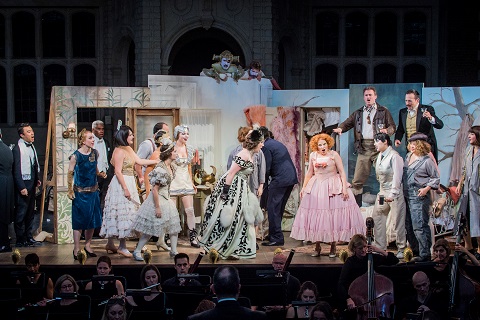
20 Jul 2017
Leoncavallo's Zazà at Investec Opera Holland Park
The make-up is slapped on thickly in this new production of Leoncavallo’s Zazà by director Marie Lambert and designer Alyson Cummings at Investec Opera Holland Park.
English Touring Opera are delighted to announce a season of lyric monodramas to tour nationally from October to December. The season features music for solo singer and piano by Argento, Britten, Tippett and Shostakovich with a bold and inventive approach to making opera during social distancing.
This tenth of ten Live from London concerts was in fact a recorded live performance from California. It was no less enjoyable for that, and it was also uplifting to learn that this wasn’t in fact the ‘last’ LfL event that we will be able to enjoy, courtesy of VOCES8 and their fellow vocal ensembles (more below …).
Ever since Wigmore Hall announced their superb series of autumn concerts, all streamed live and available free of charge, I’d been looking forward to this song recital by Ian Bostridge and Imogen Cooper.
The Sixteen continues its exploration of Henry Purcell’s Welcome Songs for Charles II. As with Robert King’s pioneering Purcell series begun over thirty years ago for Hyperion, Harry Christophers is recording two Welcome Songs per disc.
Although Stile Antico’s programme article for their Live from London recital introduced their selection from the many treasures of the English Renaissance in the context of the theological debates and upheavals of the Tudor and Elizabethan years, their performance was more evocative of private chamber music than of public liturgy.
In February this year, Albanian soprano Ermonela Jaho made a highly lauded debut recital at Wigmore Hall - a concert which both celebrated Opera Rara’s 50th anniversary and honoured the career of the Italian soprano Rosina Storchio (1872-1945), the star of verismo who created the title roles in Leoncavallo’s La bohème and Zazà, Mascagni’s Lodoletta and Puccini’s Madama Butterfly.
Evidently, face masks don’t stifle appreciative “Bravo!”s. And, reducing audience numbers doesn’t lower the volume of such acclamations. For, the audience at Wigmore Hall gave soprano Elizabeth Llewellyn and pianist Simon Lepper a greatly deserved warm reception and hearty response following this lunchtime recital of late-Romantic song.
Collapsology. Or, perhaps we should use the French word ‘Collapsologie’ because this is a transdisciplinary idea pretty much advocated by a series of French theorists - and apparently, mostly French theorists. It in essence focuses on the imminent collapse of modern society and all its layers - a series of escalating crises on a global scale: environmental, economic, geopolitical, governmental; the list is extensive.
For this week’s Live from London vocal recital we moved from the home of VOCES8, St Anne and St Agnes in the City of London, to Kings Place, where The Sixteen - who have been associate artists at the venue for some time - presented a programme of music and words bound together by the theme of ‘reflection’.
'Such is your divine Disposation that both you excellently understand, and royally entertaine the Exercise of Musicke.’
Amongst an avalanche of new Mahler recordings appearing at the moment (Das Lied von der Erde seems to be the most favoured, with three) this 1991 Mahler Second from the 2nd Kassel MahlerFest is one of the more interesting releases.
‘And there was war in heaven: Michael and his angels fought against the dragon; and the dragon fought and his angels, And prevailed not; neither was their place found any more in heaven … that old serpent … Satan, which deceiveth the whole world: he was cast out into the earth, and his angels were cast out with him.’
If there is one myth, it seems believed by some people today, that probably needs shattering it is that post-war recordings or performances of Wagner operas were always of exceptional quality. This 1949 Hamburg Tristan und Isolde is one of those recordings - though quite who is to blame for its many problems takes quite some unearthing.
There was never any doubt that the fifth of the twelve Met Stars Live in Concert broadcasts was going to be a palpably intense and vivid event, as well as a musically stunning and theatrically enervating experience.
‘Love’ was the theme for this Live from London performance by Apollo5. Given the complexity and diversity of that human emotion, and Apollo5’s reputation for versatility and diverse repertoire, ranging from Renaissance choral music to jazz, from contemporary classical works to popular song, it was no surprise that their programme spanned 500 years and several musical styles.
The Academy of St Martin in the Fields have titled their autumn series of eight concerts - which are taking place at 5pm and 7.30pm on two Saturdays each month at their home venue in Trafalgar Square, and being filmed for streaming the following Thursday - ‘re:connect’.
The London Symphony Orchestra opened their Autumn 2020 season with a homage to Oliver Knussen, who died at the age of 66 in July 2018. The programme traced a national musical lineage through the twentieth century, from Britten to Knussen, on to Mark-Anthony Turnage, and entwining the LSO and Rattle too.
With the Live from London digital vocal festival entering the second half of the series, the festival’s host, VOCES8, returned to their home at St Annes and St Agnes in the City of London to present a sequence of ‘Choral Dances’ - vocal music inspired by dance, embracing diverse genres from the Renaissance madrigal to swing jazz.
Just a few unison string wriggles from the opening of Mozart’s overture to Le nozze di Figaro are enough to make any opera-lover perch on the edge of their seat, in excited anticipation of the drama in music to come, so there could be no other curtain-raiser for this Gala Concert at the Royal Opera House, the latest instalment from ‘their House’ to ‘our houses’.
"Before the ending of the day, creator of all things, we pray that, with your accustomed mercy, you may watch over us."

The make-up is slapped on thickly in this new production of Leoncavallo’s Zazà by director Marie Lambert and designer Alyson Cummings at Investec Opera Holland Park.
And, fittingly so. For, in 1900, eight years after Leoncavallo had drawn back the curtain on the tawdrier side of theatre life in Pagliacci , and at the time when audiences were lapping up the self-sacrifice of Tosca - a well-known singer, adored by her public, redeemed by the beauty of her voice from a life of poverty or religious devotion - Zazà confirms the contemporary fascination (on-going?) with back-stage lives which combined luxury and glamour with lurid domestic soap-opera.
Indeed, the parade of performers with which Lambert opens the opera - stage-hands, Pierrots, cloaked magicians, drag artists, tutu-ed ballerinas, cabaret divas, acrobats, aerial artistes, a theatre troupe decked in full Renaissance garb - have their verismo roots in the itinerant comedians of Pagliacci, the traveling performers of Mascagni'sIris, and the professional actors in Cilèa’s Adriana Lecouvreur.
Lambert makes clear that this is an all-singing/all-dancing, show-must-go-on world, whose glitzy frontage is stained by a grittier reality. Ironically, it was a world with which Leoncavallo himself would later become familiar as, to supplement the royalties from Pagliacci, in his later years the composer toured Europe and North America, conducting condensed versions of his own opera. When he arrived in London in September 1911, a music-hall arrangement Pagliacci at the Hippodrome was announced as ‘The Sensation of the Century’: ‘Signor Leoncavallo’s appearance in person to conduct his own condensed version of his own Pagliacci, and bringing his own company with him, is an event of a unique character in the history of variety theatres.’ A media circus, indeed.
Reviewing Opera Rara’s superb concert performance of Zazà at the Barbican in 2015, I remarked that, ‘Perhaps a fully staged production is necessary to do justice to Zazà’s melodramatic excesses’. (My review contained a stage history and synopsis, to which readers might be directed.)
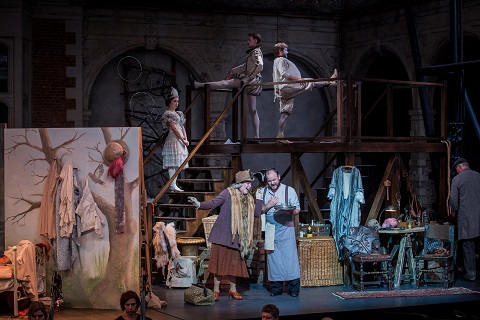 Louise Winter as Anaide and Michael Bradley as Augusto. Photo credit: Robert Workman.
Louise Winter as Anaide and Michael Bradley as Augusto. Photo credit: Robert Workman.
Lambert certainly holds nothing back scenographically in the first Act, making use of the whole span of the OHP stage to offer us a revue performance (-within the performance), a stage-crew at their labours, a working-class café-chantant, Zazà’s dressing-room-cum-bedroom, and an external staircase and platform where thespians and dancers gather to practise their art.
If that sounds a lot to take in, it is. I appreciate that it’s a milieu that we are intended to absorb, not a landscape whose every detail we should laboriously note; but, it seems a pity when dancers are practising at the barre, or show-girls are fanning bubbles, or Long John Silver is strutting his stuff, to ignore these details. Particularly so when central and peripheral events intertwine: when the protagonists’ music provides the rhythm and form for those performing in the stage’s marginal arenas; or where Zazà’s seductive flirtations are mirrored by erotic couplings at the fringe. But, without mimicking a Centre Court audience watching a thrilling rally swing back and forth, it’s impossible to take in and link up everything, and ultimately the hyperactivity - all wonderfully detailed and authentic - distracts from the central focus.
Act 2 puts the spotlight on Zazà’s dressing-room itself, all powder puffs, pillows and strewn underwear, while Act 3 transports us to the caddish Dufresne’s Parisian dwelling, which the family are preparing to leave. Trunks and cases are piled high, making the apartment appropriately spiritless but also making a nonsense of some of the text: as when Dufresne complains that his little desk, like his heart, is covered with clutter, when there isn’t a bureau in sight as all the furniture is swathed in white sheets. But, the bareness effectively complements the tightening of the dramatic intensity and focus in this Act.
Anne Sophie Duprels excels in the title role, demonstrating a dramatic range that matches her vocal commitment. Geraldine Farrar, the Met’s biggest star in 1920, and for whom the company staged Zazà, said that the role depended ‘altogether on the true, convincing interpretation of the heroine by the singer ... The singer who can make her audience feel that the emotions she is portraying are real, can make the figure live in voice and action, must always carry the part to success.’ (cited in Frederick H. Martens, The Art of the Prima Donna and Concert Singer). And, Duprels certainly lived up to this high threshold.
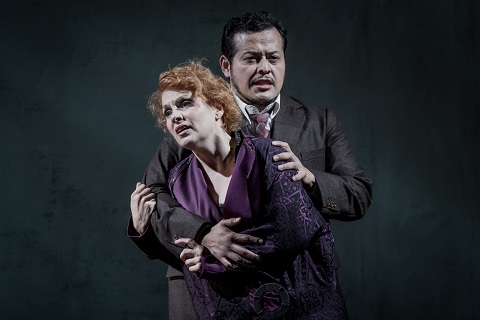 Anne Sophie Duprels as Zazà and Joel Montero as Milio. Photo credit: Robert Workman.
Anne Sophie Duprels as Zazà and Joel Montero as Milio. Photo credit: Robert Workman.
The ‘heroine’ does not have formal arias as such, rather long musical monologues that hit peaks of passion and pique though which Duprels swelled gloriously. She has warmth in the middle range, and if occasionally her soprano becomes a little harsh as the voice climbs, the singer makes Leoncavallo’s somewhat indistinctive melodies speak. They take on a declamatory quality in the sense of an on-going conversation: Zazà’s voice will be heard - indeed, it is only quietened by the ‘angelic’ calm of Defresne’s daughter Totò, charmingly played by Aida Ippolito, whose spoken words alternate with Zazà’s plaintive sung reflections on the injustice of life and recognition that she must give up hopes of a future with Dufresne.
Duprels captured all of Zazà’s precariousness - her brassiness, her wit, her volatility, her vulnerability - and did not allow the drama to lapse into melodramatic sentimentality. In fact, she seemed at times to emphasise Zazà’s self-preserving flintiness. She smeared on red lipstick as she dismissively reminded her inebriate mother - whose idiosyncrasies were richly mined by Louise Winter - that living by the matriarch’s rules led to ruinous poverty, an accusation rendered sharper by Anaide’s obvious concern for her daughter, as she picked up her stockings from the floor and laid them carefully on the bed.
There was humour too, though, as Zazà donned Brünnhilde’s helmet to ‘rescue’ the furious peg-legged pirate she’d left stranded on stage, when missing her cue as Dufresne swept her off her feet. Duprels also conveyed a strong relationship with her long-suffering dresser, Natalya, a role sung with sensitivity and acted with nuance by Ellie Edmonds. Edmonds conveyed Natalya’s genuine love for her mistress, just as Duprels’ dependence on her employee-friend was plain to see.
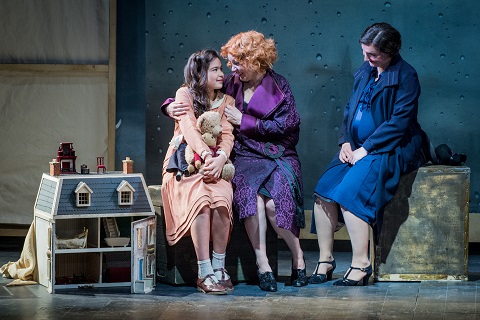 Aida Ippolito as Totò, Anne Sophie Duprels as Zazà, and Ellie Edmonds as Natalia. Photo credit: Robert Workman.
Aida Ippolito as Totò, Anne Sophie Duprels as Zazà, and Ellie Edmonds as Natalia. Photo credit: Robert Workman.
Some of the best singing of the night came from Richard Burkhard’s Cascart; ‘Zaza, piccola zingara’ was tender, firm of tone and carefully phrased. If only Zazà had heard the loyalty and affection in her former lover’s voice then she might have heeded his warnings and spared herself suffering …
The minor roles - the starry revue artiste, Floriana (Johane Ansell), James Cleverton’s Bussy, a writer, impresario Courtois (Charne Rochford), stage manager Duclou (Eddie Wade), and Michael Bradley’s Augusto, a waiter - were persuasively sung and though their contributions were often quite brief, the direction was detailed and lively.
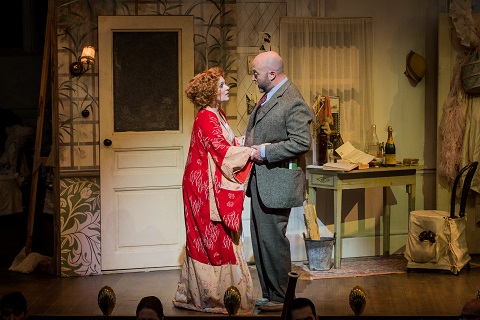 Richard Burkhard as Cascart and Anne Sophie Duprels as Zazà. Photo credit: Robert Workman.
Richard Burkhard as Cascart and Anne Sophie Duprels as Zazà. Photo credit: Robert Workman.
As Zazà’s weak-willed, selfish deceiver, Milio Dufresne, Joel Montero seemed out of sorts. Though he produced a stirring tone at times, there were a lot of rough edges and the intonation was hit-and-miss and wavering.
Peter Robinson and the City of London Sinfonia made much of the brash colours and popular-song rhythms of Act 1, and brought out the more nuanced instrumental detail of the latter acts. This was disciplined, stylish playing.
When Farrar - who had a large following of idolising young women, nicknamed ‘Gerry-flappers’ - bid farewell to the stage in the title role of Leoncavallo’s opera, she was festooned with balloons and flowers, hailed with banners, ‘Hurrah, Farrar! Farrar Hurrah!’, eulogised in speeches of devotion, and paraded up Broadway in an open top car (as reported in Music Journal, October 1965).
Dream and reality, art and life: Zazà struggles to recognise the distinction between a world that can be created on a theatre stage and a life that must be lived. Perhaps it is ever thus. But, as Tosca learned that integrity is more than important than life, by the close Zazà has learned that integrity is more important than love.
Claire Seymour
Leoncavallo: Zazà
Zazà - Anne Sophie Duprels, Milio - Joel Montero, Anaide - Louise Winter, Cascart - Richard Burkhard, Bussy - James Cleverton, Floriana - Johane Ansell, Natalia - Ellie Edmonds, Courtois - Charne Rochford, Duclou - Eddie Wade, La Signora Dufresne - Joanna Marie Skillett, Marco - Oliver Brignall, Augusto - Michael Bradley, Totò Dufresne - Aida Ippolito, Claretta - Alexandra Stenson, Simona - Charlotte Hewett; Director - Marie Lambert, Conductor - Peter Robinson, Designer - Alyson Cummins, Costume Designer - Camille Assaf, Lighting Director - Mark Jonathan, Choreographer - Danilo Rubeca, City of London Sinfonia, Opera Holland Park Chorus.
Investec Opera Holland Park; Tuesday 18th July 2017.